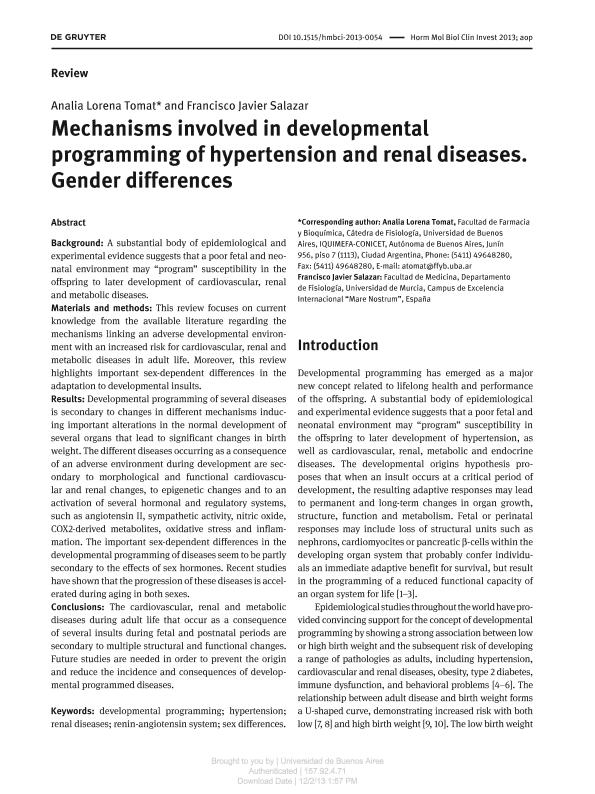Mostrar el registro sencillo del ítem
dc.contributor.author
Tomat, Analia Lorena

dc.contributor.author
Salazar, Francisco Javier
dc.date.available
2019-09-27T22:04:14Z
dc.date.issued
2014-05
dc.identifier.citation
Tomat, Analia Lorena; Salazar, Francisco Javier; Mechanisms involved in developmental programming of hypertension and renal diseases. Gender differences; De Gruyter; Hormone Molecular Biology and Clinical Investigation; 18; 2; 5-2014; 63-77
dc.identifier.issn
1868-1891
dc.identifier.uri
http://hdl.handle.net/11336/84745
dc.description.abstract
Background: A substantial body of epidemiological and experimental evidence suggests that a poor fetal and neonatal environment may "program" susceptibility in the offspring to later development of cardiovascular, renal and metabolic diseases. Materials and methods: This review focuses on current knowledge from the available literature regarding the mechanisms linking an adverse developmental environment with an increased risk for cardiovascular, renal and metabolic diseases in adult life. Moreover, this review highlights important sex-dependent differences in the adaptation to developmental insults. Results: Developmental programming of several diseases is secondary to changes in different mechanisms inducing important alterations in the normal development of several organs that lead to significant changes in birth weight. The different diseases occurring as a consequence of an adverse environment during development are secondary to morphological and functional cardiovascular and renal changes, to epigenetic changes and to an activation of several hormonal and regulatory systems, such as angiotensin II, sympathetic activity, nitric oxide, COX2-derived metabolites, oxidative stress and inflammation. The important sex-dependent differences in the developmental programming of diseases seem to be partly secondary to the effects of sex hormones. Recent studies have shown that the progression of these diseases is accelerated during aging in both sexes. Conclusions: The cardiovascular, renal and metabolic diseases during adult life that occur as a consequence of several insults during fetal and postnatal periods are secondary to multiple structural and functional changes. Future studies are needed in order to prevent the origin and reduce the incidence and consequences of developmental programmed diseases.
dc.format
application/pdf
dc.language.iso
eng
dc.publisher
De Gruyter

dc.rights
info:eu-repo/semantics/openAccess
dc.rights.uri
https://creativecommons.org/licenses/by-nc-sa/2.5/ar/
dc.subject
DEVELOPMENTAL PROGRAMMING
dc.subject
HYPERTENSION
dc.subject
RENAL DISEASES
dc.subject
RENIN-ANGIOTENSIN SYSTEM
dc.subject
SEX DIFFERENCES
dc.subject.classification
Otras Ciencias de la Salud

dc.subject.classification
Ciencias de la Salud

dc.subject.classification
CIENCIAS MÉDICAS Y DE LA SALUD

dc.title
Mechanisms involved in developmental programming of hypertension and renal diseases. Gender differences
dc.type
info:eu-repo/semantics/article
dc.type
info:ar-repo/semantics/artículo
dc.type
info:eu-repo/semantics/publishedVersion
dc.date.updated
2019-09-27T21:02:17Z
dc.journal.volume
18
dc.journal.number
2
dc.journal.pagination
63-77
dc.journal.pais
Alemania

dc.description.fil
Fil: Tomat, Analia Lorena. Consejo Nacional de Investigaciones Científicas y Técnicas; Argentina. Universidad de Buenos Aires. Facultad de Farmacia y Bioquímica. Departamento de Ciencias Biológicas. Cátedra de Fisiología Humana; Argentina
dc.description.fil
Fil: Salazar, Francisco Javier. Universidad de Murcia; España
dc.journal.title
Hormone Molecular Biology and Clinical Investigation
dc.relation.alternativeid
info:eu-repo/semantics/altIdentifier/doi/http://dx.doi.org/10.1515/hmbci-2013-0054
dc.relation.alternativeid
info:eu-repo/semantics/altIdentifier/url/https://www.degruyter.com/view/j/hmbci.2014.18.issue-2/hmbci-2013-0054/hmbci-2013-0054.xml
Archivos asociados
